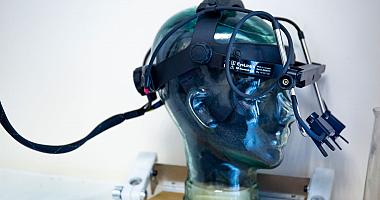MRes
Research Methods in Psychology
Content navigation menu
Why study MRes Research Methods in Psychology at Goldsmiths
The programme aims to equip you with a sound understanding of the research methods and skills necessary to conduct high-level research in psychology, using a wide range of approaches and techniques.
- The MRes provides a broad training in behavioural and social science research methodologies – including the fundamentals of quantitative and qualitative research (research design, data collection and data analysis) – and provides practical, 'hands-on' experience.
- You'll have the opportunity to develop your own research interests by conducting an empirical research project under the supervision of a member of staff.
- The MRes will appeal to you if you would like to develop your career in experimental research, or enhance your ability to apply research skills in either the public or the private sector. The programme’s structure and content reflects the fact that such careers currently span a wide range of settings (including academic, civil service, industrial, educational and clinical contexts).
Contact the department
If you have specific questions about the degree, contact Karina Linnell.
Length
1 year full-time or 2 years part-time
Fees
Home - full-time: £9630
Home - part-time: £4815
International - full-time: £22640
Department
Programme overview
The MRes will enable you to:
- Gain a thorough knowledge of a range of behavioural and social science methodologies
- Understand the principles of quantitative and qualitative research
- Correctly apply advanced statistical and computing techniques
- Enhance your skills in critical analysis and evaluation of research findings
- Consider philosophical and ethical issues in relation to science in general and to psychological research in particular
- Develop expertise in data collection, handling large data sets and data analysis
- Appropriately plan and design, present and evaluate, effective psychological research studies
What you'll study
The MRes runs for one academic year full-time or two years part-time. Most of the lectures, seminars and workshops on the programme run in the first two terms, but you are expected to pursue your studies beyond formal term times.
Lectures, seminars and workshops for the programme are timetabled mainly for Mondays and Tuesdays, but you may occasionally be required to attend other seminars and workshops held by the Department and Goldsmiths.
You must take all the modules listed in the syllabus, and they all include a strong practical component.
Additional workshops and seminars
In addition to the taught modules, you will be encouraged to attend the Psychology Department Invited Speaker Series, and any other relevant seminars and career talks.
You are welcome to attend the Department’s other seminar series, which are hosted by eminent academics and practitioners.
How you'll be assessed
You’ll be assessed by a variety of methods, depending on your module choices. These may include written examinations, coursework, and dissertation.
Academic staff in the department who will be the main contributors to this programme include:
- Dr Karina Linnell (Programme Coordinator)
- Dr Peter Holland
- Dr Maria Herrojo Ruiz
- Dr Manuel Anglada Tort
Find out more about staff in the Department of Psychology.
Careers
The programme provides the ideal preparation for a research career.
Many students go on to do a PhD, or to conduct experimental research in a wide variety of settings.
Skills
The programme aims to equip you with a sound understanding of methods and skills necessary to conduct high-level research in psychology, using a wide range of approaches and techniques.
Research training
The programme was among the first to be recognised by the Economic and Social Research Council (ESRC) as providing the generic and specific research training required by psychology students in receipt of ESRC studentship awards.
Between 2011 and 2015, the programme was the research methods training Masters for the psychology pathway within the Goldsmiths and Queen Mary ESRC-funded Doctoral Training Centre (2011-2015).
Since 2017, the programme provides its psychology research training under the umbrella of the South-East Network for Social Sciences, an ESRC Doctoral Training Partnership (DTP) between 10 prestigious universities, including Goldsmiths.
Students in receipt of an ESRC 1+3 PhD studentship in the psychology pathway can take this programme as the first year of a 4-year PhD programme; students who have completed the MRes self-funded, are eligible to bid for ESRC funded +3 PhD studentships.
Fees and funding
Annual tuition fees
These are the PG fees for students starting their programme in the 2024/2025 academic year.
- Home - full-time: £9630
- Home - part-time: £4815
- International - full-time: £22640
If your fees are not listed here, please check our postgraduate fees guidance or contact the Fees Office, who can also advise you about how to pay your fees.
It’s not currently possible for international students to study part-time under a student visa. If you think you might be eligible to study part-time while being on another visa type, please contact our Admissions Team for more information.
If you are looking to pay your fees please see our guide to making a payment.
Funding opportunities
Explore the Goldsmiths scholarships finder to find out what funding you may be eligible for.
Scholarships
Leverhulme Trust Aural Diversity (LAURA) Doctoral Studentships
Goldsmiths is proud to be a partner of the Aural Diversity Doctoral Research Hub (LAURA), funded by the Leverhulme Trust and led by the University of Salford. LAURA provides interdisciplinary PhD and Masters training in the study of hearing and listening differences. Find out more about the LAURA Doctoral Studentships.
Paying your fees
Find out about paying your tuition fees.
Additional costs
In addition to your tuition fees, you'll be responsible for any additional costs associated with your course, such as buying stationery and paying for photocopying. You can find out more about what you need to budget for on our study costs page.
There may also be specific additional costs associated with your programme. This can include things like paying for field trips or specialist materials for your assignments. Please check the programme specification for more information.
Entry requirements
You should normally have (or expect to be awarded) the following qualifications:
- An undergraduate degree of at least upper second class standard in a relevant subject area
You might also be considered for some programmes if you aren’t a graduate or your degree is in an unrelated field, but have relevant experience and can show that you have the ability to work at postgraduate level. We consider all aspects of your application when making a decision and may still be able to offer a place even if your qualifications or grades do not meet the published requirements.
International qualifications
We accept a wide range of international qualifications. Find out more about the qualifications we accept from around the world.
If English isn’t your first language, you will need an IELTS score (or equivalent English language qualification) of 6.5 with a 6.5 in writing and no element lower than 6.0 to study this programme. If you need assistance with your English language, we offer a range of courses that can help prepare you for postgraduate study.
How to apply
You apply directly to Goldsmiths using our online application system.
To complete your application, you will need to have:
- Details of your academic qualifications
- The email address of your referee who we can request a reference from, or alternatively a copy of your academic reference
- Contact details of a second referee
- Copies of your educational transcripts or certificates
- A personal statement
You'll be able to save your progress at any point and return to your application by logging in using your username/email and password.
Before you apply for a research programme, we advise you to get in touch with the programme contact, listed above. It may also be possible to arrange an advisory meeting.
Before you start at Goldsmiths, the actual topic of your research has to be agreed with your proposed supervisor, who will be a member of staff active in your general field of research. The choice of topic may be influenced by the current research in the department or the requirements of an external funding body.
If you wish to study on a part-time basis, you should also indicate how many hours a week you intend to devote to research, whether this will be at evenings or weekends, and for how many hours each day.
When to apply
We accept applications from October for students wanting to start the following September.
We encourage you to complete your application as early as possible, even if you haven't finished your current programme of study. It's very common to be offered a place conditional on you achieving a particular qualification.
If you're applying for external funding from one of the Research Councils, make sure you submit your application by the deadline they've specified.
Late applications will only be considered if there are spaces available.
Selection process
Admission to many programmes is by interview, unless you live outside the UK. Occasionally, we'll make candidates an offer of a place on the basis of their application and qualifications alone.
Further guidance
Read our guide to applying for a postgraduate degree at Goldsmiths.






